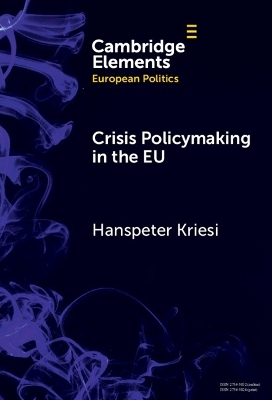
Crisis Policymaking in the EU
The COVID-19 Crisis and the Refugee Crisis 2015-16 Compared
Seiten
2025
Cambridge University Press (Verlag)
978-1-009-54945-5 (ISBN)
Cambridge University Press (Verlag)
978-1-009-54945-5 (ISBN)
- Noch nicht erschienen (ca. Januar 2025)
- Versandkostenfrei innerhalb Deutschlands
- Auch auf Rechnung
- Verfügbarkeit in der Filiale vor Ort prüfen
- Artikel merken
This study compares crisis-specific policymaking, its causes and consequences, at the two levels of the EU polity during the COVID-19 and the refugee crisis 2015-16. In both crises, EU policymaking responded to exogenous pressure and was dominated by executive decision-making.
This Element compares crisis-specific policymaking, its causes and consequences, at the two levels of the EU polity during the COVID-19 and the refugee crisis 2015–16. In both crises, EU policymaking responded to exogenous pressure and was dominated by executive decision-making. Still, it also differed in three critical aspects: it was much more salient, consensual, and effective during the COVID-19 than the refugee crisis. The present study accounts for both similarities and differences, which it attempts to explain by features of the nature of the crises. The key argument of the study is that the policymaking process during crises is, to a large extent, determined by the crisis situation – the crisis-specific functional problem pressure, the institutional context (of the EU polity), and the corresponding political pressure at the origin of a given crisis. This title is also available as Open Access on Cambridge Core.
This Element compares crisis-specific policymaking, its causes and consequences, at the two levels of the EU polity during the COVID-19 and the refugee crisis 2015–16. In both crises, EU policymaking responded to exogenous pressure and was dominated by executive decision-making. Still, it also differed in three critical aspects: it was much more salient, consensual, and effective during the COVID-19 than the refugee crisis. The present study accounts for both similarities and differences, which it attempts to explain by features of the nature of the crises. The key argument of the study is that the policymaking process during crises is, to a large extent, determined by the crisis situation – the crisis-specific functional problem pressure, the institutional context (of the EU polity), and the corresponding political pressure at the origin of a given crisis. This title is also available as Open Access on Cambridge Core.
1. Introduction; 2. Theoretical framework; 3. Design; 4. Salience and centrality; 5. Policy support; 6. Policy output; 7. Conclusion.
| Erscheint lt. Verlag | 31.1.2025 |
|---|---|
| Reihe/Serie | Elements in European Politics |
| Zusatzinfo | Worked examples or Exercises |
| Verlagsort | Cambridge |
| Sprache | englisch |
| Themenwelt | Sozialwissenschaften ► Politik / Verwaltung ► Politische Systeme |
| Sozialwissenschaften ► Politik / Verwaltung ► Politische Theorie | |
| Sozialwissenschaften ► Politik / Verwaltung ► Staat / Verwaltung | |
| ISBN-10 | 1-009-54945-6 / 1009549456 |
| ISBN-13 | 978-1-009-54945-5 / 9781009549455 |
| Zustand | Neuware |
| Haben Sie eine Frage zum Produkt? |
Mehr entdecken
aus dem Bereich
aus dem Bereich
über Alltagsorte des sozialen Zusammenhalts
Buch | Softcover (2024)
transcript (Verlag)
24,00 €


